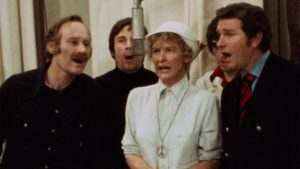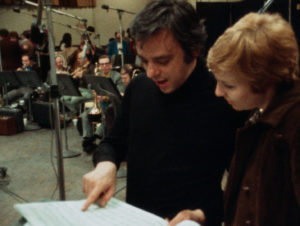STUDIO: Criterion Collection | DIRECTOR: D.A. Pennebaker | CAST: Elaine Stritch, Dean Jones, Pamela Myers, Beth Howland, Susan Browning, Donna McKechnie, Stephen Sondheim, Harold Prince
RELEASE DATE: 8/17/21 | PRICE: DVD $21.99, Blu-ray $27.80
BONUSES: New audio commentary by composer-lyricist Stephen Sondheim; commentary from 2001 featuring director D. A. Pennebaker, actor Elaine Stritch, and Broadway producer Harold Prince; conversation among Sondheim, orchestrator Jonathan Tunick, and critic Frank Rich; new interview with Tunick; audio excerpts from interviews with Stritch and Prince; “Original Cast Album: ‘Co-Op,’” a 2019 episode of the TV series “Documentary Now!”; reunion of the cast and crew of “Original Cast Album: ‘Co-Op’”
SPECS: NR | 53 min. | Documentary | 1.33:1 | monaural
“Elaine liked to drink.” A declarative statement made by Stephen Sondheim in an onscreen featurette contained in this release, which tersely sums up the well-remembered last segment of this 1970 doc by D.A. Pennebaker.
Original Cast Album: Company is a particular favorite of Broadway devotees, as it is chronicles the marathon recording session (plus one additional shorter session) that produced the titular cast album. The thing that strikes one immediately about the doc is its length — at 53 minutes it could easily have been a half-hour longer and still would’ve been a classic. But Pennebaker made this as the first of a prospective series of cast album docs (which was never to be) and it clearly was geared toward PBS, where the shorter the length the better.
Pennebaker happened to be assigned to a hell of a cast album to chronicle. Company was Stephen Sondheim’s breakout show, in which a series of complex, deeply moving songs were showcased. The result was a then-pungent commentary on married couples (courtesy of the book by actor George Furth) and a series of absolutely timeless songs that have lyrics as densely worded as Gilbert and Sullivan pieces, with beautifully orchestrated melodies.
While it’s apparent that Pennebaker wanted to fashion the film in a traditional way — with brief interviews with a few performers and a few of the people behind the scenes (Sondheim, Furth, director Harold Prince, etc.) — it was surely clear from the start that the main mission was to show the performers delivering their bravura set-piece songs “for posterity” on the cast album. Thus, the doc focuses right in on the tour de force songs that remain Company’s greatest legacy — “Another Hundred People,” “Getting Married Today,” “Being Alive,” and “The Ladies Who Lunch.”
Pennebaker decided to unravel the “layers” that went into the music. And so, while we see Pamela Myers singing the unforgettable “Another Hundred People,” the different parts of the orchestration are highlighted. As the song is performed (in what seems like one stunningly perfect take), each piece of the puzzle is unveiled, as edits reveal the strings, brass, and woodwinds, with the instruments on-camera heard louder than the rest. It’s the film’s best scene on a technical level and a “case study” for musicians who want to see how a Broadway number is orchestrated.
 The most-cited sequence in the film, though, is the conclusion, which covers Elaine Stritch’s failed attempts to nail “Ladies Who Lunch.” Stritch delivers impassioned renditions of the song that would blow away most audience members. But Sondheim, the orchestra leader, and record producer Tom Shepard hear that she’s speaking the song rather than singing it.
The most-cited sequence in the film, though, is the conclusion, which covers Elaine Stritch’s failed attempts to nail “Ladies Who Lunch.” Stritch delivers impassioned renditions of the song that would blow away most audience members. But Sondheim, the orchestra leader, and record producer Tom Shepard hear that she’s speaking the song rather than singing it.
Stritch is clearly high-strung — and also drunk, as is revealed in the supplements — and can’t hit the required notes. Sondheim and the rest try to comfort her, but she gets more and more uptight listening to the playback, and eventually she is sent home to come back another day for a second session. (Which she aces in one take.)
This last chunk of the film is a classic bit of “fly on the wall” filmmaking, as all the individuals involved in the scene are too polite to mention the obvious cause of the problem and instead we see them murmuring to each other as the ordeal continues. (At one point, a none-too-subtle Sondheim sinks his head into his arms in the booth as Stritch is “speaking” the song again.)
Two newly made visual supplements supply background on the film. Orchestrator Jonathan Tunick is interviewed in one, explaining the rules for orchestration and the role it played in cast album recordings. Tunick discusses the orchestrator’s close connection to the composer/lyricist, noting that he would sit on a piano bench next to Sondheim as he played his scores. This, Tunick notes, was invaluable, as it gave him an idea of what “accurate phrasing” for the songs was like. Tunick’s final word on Company? “Every note was paid for.”
A more info-packed supplement features former critic Frank Rich interviewing Tunick and Sondheim. The piece is odd on a visual level, as a split-screen is employed for the participants, who are socially distanced in someone’s living room. Thus, the equivalent of Zoom “boxes” contain people who are actually in the same space.
The conversation, though, is more “connected” than the visuals imply, as the two theater vets discuss how Company was fashioned from a series of short one-act plays written by character actor George Furth. The topic that later takes over the conversation — naturally enough — is Stritch and her drinking.
Rich asks the most obvious question: Why was Elaine scheduled to sing last if everyone in the studio knew of her nervousness at performing and her proclivity for “a little sip of brandy” to lose her stage fright?
Sondheim explains that she was scheduled to sing early in the afternoon and Dean Jones (the show’s star upon its Broadway opening, and something of a “diva,” according to the participants) was complaining that he would have to sing the exhausting show-stopper “Being Alive” last. Stritch traded slots with him and thus began the troubles.
Sondheim notes that “confidence was not [Elaine’s] middle name” ands so she’d been drinking brandy in a dressing room in the studio where she was keeping her little dog. The composer notes that Pennebaker was packing up his camera and lights when he saw what was going on with Stritch and realized he had to film whatever he could — as he was running out of film stock and his 16-hour lights were about to pop.
When asked what the “message” of the film is, Sondheim replies that it is “what happens to a singer’s voice when they drink.” He clarifies this by stressing that, for the singer, it’s “not the production of the note” that differentiates singing a lyric from “speaking” it; it’s actually “the attitude toward the note.”
Original Cast Album: Company has such a following that it has been spoofed twice. The first was a very funny short film coscripted by and starring Chris Elliot titled “Housewives! The Making of the Cast Album”; it aired on Letterman’s Late Show in October of 1993. In that short film — not acknowledged in this release — Elliot plays a Stritch-like performer who has been drinking and can’t perform his song during a cast-album recording. (You can check it out here.)
Curiously, the second spoof, which is included here, doesn’t have a single joke about drinking. “Original Cast Album: ‘Co-Op,’” made for the IFC comedy series “Documentary Now!” in 2019, is an accurate — if not especially funny — parody that, interestingly, uses some of the original Sondheim melodies (slightly altered) for the fake songs. A full 33-minute Zoom chat between the participants in “Original Cast Album: ‘Co-Op,’” can be found here, but the two commentary tracks included in the package are of much more interest.
 A 2001 track, in which Pennebaker interviewed Stritch and Harold Prince, presents a wide range of information, starting with Pennebaker’s rules for filmmaking. His breakdown of how he shot the “Another Hundred People” sequence spotlighting different parts of the orchestra is fascinating (as is his earnest condemnation of doc-makers who rely too much on placing their camera on a tripod); also his philosophy that “you make the film that’s there,” working around hurdles both technical and behavioral.
A 2001 track, in which Pennebaker interviewed Stritch and Harold Prince, presents a wide range of information, starting with Pennebaker’s rules for filmmaking. His breakdown of how he shot the “Another Hundred People” sequence spotlighting different parts of the orchestra is fascinating (as is his earnest condemnation of doc-makers who rely too much on placing their camera on a tripod); also his philosophy that “you make the film that’s there,” working around hurdles both technical and behavioral.
The oddest piece of info the filmmaker passes on is that the producers of the doc thought they could find an airline sponsor for the film’s TV presentation, so they courted Eastern Airline execs, who had great trouble with the song “Barcelona.” This was not because, Pennebaker notes, it was about a stewardess having a sexual affair with a man, but more because “she’d be missing her flight.” (Pennebaker notes that Sondheim refused to change the lyric, and so there was no airline sponsorship.)
Director Harold Prince maintains that he was the one who felt that Furth’s short one-acts needed to be made into a musical. He also discusses Dean Jones’ difficulties with the production, which stemmed from marital difficulties he was experiencing at the time and the fact that he didn’t like living in NYC. Prince notes that he agreed to release Jones from his contract a few weeks into the production — provided that Jones appear in the opening night cast (and, presumably, sing on the cast album).
Stritch notes to Pennebaker that she knew her role in Company was written specifically for her, and takes great delight in seeing herself onscreen before the “Ladies Who Lunch” debacle. (“I look adorable singing that song!” she exclaims at one point, about the ensemble piece “The Little Things You Do Together.”)
Pennebaker recounts to her his feelings upon seeing her do the initial takes of the song in the studio (that she was doing a great job and was utterly moving in her delivery of the lyric), and his surprise that she was being asked to do repeated takes. For her part, Stritch notes she did have a few glasses of champagne but that her drinking “didn’t cause the problem” she was having in singing the song — although she does admit if she had a similar situation in the present day she “wouldn’t think” of having a single glass of champagne before singing.
Sondheim’s commentary track, recorded for this release, contains great reflections on the documentary, Company, and even the very nature of musical theater (as a “presentational form of art” that requires an audience to exist). Clearly watching the film, Sondheim grows silent each time a performer does a bravura number, but takes time at the beginning of the track to discuss the genesis of Company from Furth’s short one-acts and the usual “rules” concerning cast albums. (They were recorded the first Sunday after a musical officially opened on Broadway.)
Although he has high praise for Dean Jones singing “Being Alive” (“very touching,” he concludes), the salient part of the conversation is, of course, about Stritch. He was aware of her drinking brandy in the other room but recalls trying to calm her down for the many retakes that took place during the initial, marathon session. When the completed take she came back to do is shown onscreen, Sondheim remarks with much joy and pride, “It’s exhilarating to see her do it so well… because it’s a song she owns.”
|
Buy or Rent Original Cast Album: Company
|
|---|
Leave a Reply